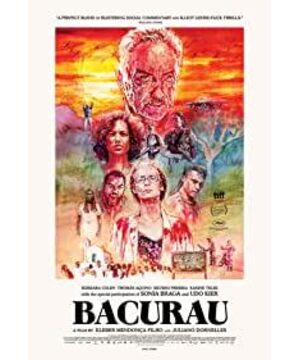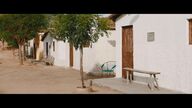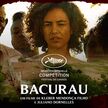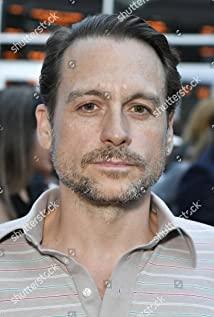Fans and friends who follow the Cannes Film Festival may already be familiar with the name Kleiber Mendoza Jr. The director, born in Recife, Brazil in 1968, was shortlisted for the Rotterdam International Film Festival with his feature film debut "The Sound of the House".
In 2016, his second feature film "Aquarius" directly airborne the main competition unit of the Cannes Film Festival, conquering many media and fans, including the French "Cinema Manual" with extremely high quality, and became a favorite of many people. Top ten of the year.
The previous work "Aquarius" is a story with a realistic color. Through the experience of a "nail house" in the director's hometown of Recife, it carefully describes the current situation of Brazilian society. In the film, the surreal elements that appear from time to time give Mendoza's work a unique style.
Three years later, Mendoza and his art director Juliano Dohenellis co-directed the new work "Bacro Successfully won the jury award.
Surprisingly, Mendoza did not stick to the previous realism style, but boldly told a fable, and packaged it in an extremely typified style. Obviously, the uniqueness of "Baclaw" lies in this.
As for why such a story was created, we may want to pay attention to current political issues in Brazil. As early as the beginning of this year, Bolsonaro, the leader of the Brazilian Social Liberal Party, was formally sworn in. He was regarded by the media as the first “right-wing president” to appear in Brazil in more than 30 years. The president’s favorite gesture is shooting, and he has served in the military for a long time.
More than 75% of the masses support this leader, but there are also some young people who are caught in immense anger and despair. The reason is that he put forward the slogan "Brazil is supreme", ignored the climate crisis, and said that "the Amazon rainforest is the lung of the earth" is a fallacy.
He suppressed culture, saying that art is not real work. He even insulted race, women, and LGBT groups, and was called "Brazilian Trump" by the leftist media in the West. The real Trump also posted congratulations on Twitter after Bolsonaro took office, and also said: The United States is with you.
Of the 20 most violent cities in the world, up to seven are from Brazil. Due to the rampant gangs and terrorists, 64,000 people die from shooting in Brazil every year. In the face of this situation, President Bolsonaro hopes to deploy troops in the streets; however, the situation of police violent law enforcement and even collusion with criminals has become more and more serious. It was in such a political environment that Mendoza was angry and created "Baclaw."
The time of the film is set in the near future where the year is not clear. The first shot of the opening uses the perspective of the universe directly, looking at the earth from space. Then a satellite passed by, combined with the drone that often appeared in the film, gave the film a layer of science fiction.
The camera follows a truck to the scene of the story, located in Baklau, a somewhat closed village in northeastern Brazil.
We entered this village from the perspective of the heroine Teresa. The first incident was her grandmother's funeral. This is not only in line with the theme of death in the whole film, but also a showcase of Brazilian traditional culture. From our Eastern perspective, this funeral will undoubtedly bring a lot of spectacle experiences. But that shock and solemnity, I believe it has crossed the national and regional boundaries.
The subsequent series of shots show us the daily life of this village, the magnificent celestial phenomena of Bakrao and the unique landscapes of Latin America: villagers driving vehicles, children in the vegetable garden, old women repairing water pipes, villagers bathing, with eroticism. Meaningful paintings, bazaars, historical museums, clinics.
The layout of these external environments allows us to fully appreciate the rustic atmosphere of this village and the traditional Brazilian culture of the region, and at the same time show the "nature" of the Baklau people from the side.
Then, when the flying saucer, which symbolizes technological civilization, passed over Bakrau, the whole story ushered in the core moment-the beginning of the invasion. This noisy flying saucer became the start signal of this "invasion".
Since then, the hearts of the villagers can no longer settle; they all seem to realize that something strange is about to happen.
Two well-dressed cross-country motorcyclists became the vanguard of this "invasion". Through their clothing and language, we can tell that they are also Brazilians, but they don't have any obvious regional characteristics. They obviously come from some more modern cities. It is such a role between traditional culture and foreign culture that perfectly fits the characteristics of "pioneer" in the film.
Under the gaze of a certain aircraft, the two motorcyclists began to shoot and kill the villagers. Both the perspective and follow them back to the residence. Since then, the English-speaking intruder has officially appeared on the scene, and the metaphor of language in this film has also begun to fully appear. The symbolic relationship of the "invasion" of the Bakerau villagers who only speak Brazilian, the motorcyclists who master both Brazilian and English, and the group of tourists who only speak English has gradually become clear.
Inside the house, for the reason of "killing one's own person", the two motorcyclists ushered in their own deaths. They were unaware co-conspirators to some extent, but they were brutally eliminated because they violated certain rights. Such methods are almost a portrayal of modern hegemonic countries. It is also from here that this film brings us into a feast of genre elements of crime and horror with a large number of violent scenes.
On a live broadcast vehicle, a video collection is being shown on the screen. Scenes of violent incidents in Brazilian cities are staged in turn, many of which are appalling and cruel. In the worldview conveyed in the film, violence has long been commonplace; most people seem to have been assimilated by "violence" and become numb.
Ironically, there have also been some contradictions within this group of intruders. On the land far away from the city, their primitive animality was stimulated, and even if they were their companions, they could not avoid being treated mercilessly. This also paved the way for the failure of the entire killing action. When this group of people decided to split up, the villagers who had been hidden for a long time launched a counterattack.
In the rain of bullets, blood was splashed everywhere, and the camera neatly showed every killing. Among the pleasure brought by the high degree of typification, it seems that we should also reflect on the relationship between "violence and anti-violence".
Attentive movie fans may notice that several close-up shots of different people stuffing small fruits into their mouths always appear repeatedly and briefly in the film. In my opinion, this is a symbol with a mysterious temperament, which has given the villagers "divine power", so that the traditional culture they represent can resist violence and the invasion of external culture.
The part of the invaders in the Baklaw History Museum may also be the climax of the film. When the invaders slack and casually play with the various collections in the museum, we can feel the desecration and destruction of traditional culture by modern civilization.
Through the intruder's subjective perspective, he found that all the guns on the wall were gone. This is the "weapon of history" and the source of strength for the Bakrau people to fight back. It was at that moment that the young Bakrau yelled angrily and wanted to execute the intruder.
For the leaders and the leaders of the invaders, the Bakrou people used their most traditional and most ethnic method-to exile or bury them alive to execute them.
The soundtrack of the film is a combination of traditional folk music and modern electronic music, which demonstrates the mutual restraint and confrontation of the two cultures, and also injects a certain vitality into the film's appreciation. At the end of the film, in the melodious folk music, the villagers bury the criminal invaders deeply with mud.
Perhaps Bakrau will encounter a more severe invasion in the future, but this ending has already expressed the director's attitude toward the current situation, and they have long been fearless. Because they are with this land, with the long and profound traditional culture, with all the people of Baklau.
We seem to have seen too many films that try to show cultural conflicts and "land love" characteristics, but why will "Baclaw" be so popular this year? Perhaps it is the film’s full balance of visual symbols and metaphors behind them, as well as the accurate observation and depiction of social emotions.
In addition to the powerful political expression, it did not weaken the charm of the image itself, which is bound to be inseparable from the highly categorized style of the film.
Due to the slightly exaggerated imagination, the film naturally does not have too much authenticity, and is closer to a social fable. But just like "Parasite", which won the Palme d'Or at this year's Cannes Film Festival, as long as the metaphor you inject can be perfectly supported by the content, no matter what form it is, it will show a strong discourse power.
These two works invariably adopt a genre film creation grammar, and they are also inseparable from the current film environment. The genre rule is undoubtedly a very universal film grammar. Through this form, even audiences who do not understand the creative context of the film can be accepted; but if they understand the background again, they will feel a deeper shock.
A short review of the French "Cinema Manual" wrote: The two directors wrote a great political novel with Bakrau. The strong vitality in this novel is a virtue necessary to counter the weirdness of contemporary far-right figures.
In Latin America, a land with a strong magical temperament, director Mendoza used this work to prove a new approach to realist movies in the modern context. He used extremely concise and powerful narrative methods, combined with highly typified video language, to create such an extremely vigorous work. It seems that he himself is also a Bakrau who guards the village. Facing the rising of the extreme right, he did not feel timid at all, and did his best to declare war on the outrageous status quo in Brazil.
Author | Deca's Sheep; Public Number | Seeing Death in Movies
Edit | Riding a Rooftop Boy; please indicate the source for reprinting
View more about Bacurau reviews








